The 2014 ISAM World Congress in Yokohama

To the Japanese Ministry of Health
Through ongoing failures to manage the prescribing of BZs and similar drugs, you have been causing a serious and major problem for society.
I have been receiving many SOS messages from people desperate for help. The reality is they have nowhere to turn to because the doctors are insufficiently trained and ignorant about BZ dependency and withdrawal. The fact these people are all turning to me (an English teacher from abroad) for help is further evidence of failures in the current health system.
Why should an English teacher be doing your job? This is a major problem requiring urgent attention including setting of guidelines, training for medical workers, and immediate provision of specialty withdrawal clinics.
NOTICE
As Japanese is not my native tongue, please understand that there may be some slightly unnatural Japanese wording in the translation.
The 2014 ISAM (International Society of Addiction Medicine) World Congress was held from October 2nd ~ 6th at the Pacifico Yokohama Conference Center in Yokohama, Japan.
I had the opportunity to present on October 6th, 2014 for the purpose of highlighting the dangers of “miss-prescribing” benzodiazepines and similar drugs.
This was a unique opportunity for a sufferer to speak firsthand about their experience. In addition, I included many global points that I feel needed to be emphasized. In this way, my presentation introduced more general issues through my own experience.
I included recommendations at the end in the hope they may lead to some changes for the better.
Top of Page
A moment to reflect and appreciate

I would like to take this opportunity to request a minute’s silence in memory of British MP, the late Hon. James Dobbin who sadly passed on 6th September 2014.
Jim’s story, including his tireless efforts in his work regarding safer controls, patients’ rights and care, can be read in this article published by The Conservative Woman magazine.
Top of Page
My Presentation
Iatrogenic Benzodiazepine Drug Dependency in Japan & Globally
– the need for more controls, knowledge, care and services –
Presented by: Wayne Douglas
Affiliation: Independent (former patient)
Top of Page
KEYWORDS: Benzodiazepines (BZs), prescriptions (RXs), iatrogenic, addictiveness, dependency, withdrawal, adverse effects, misprescribing, misdiagnosing dependency, socio-economic costs, epidemic.
INTRODUCTION: Five key points that are not understood by many doctors are presented in conjunction with my own experience including subsequent litigation (supplementary) raising additional questions about who is protecting society.
BACKGROUND: I am not a doctor. I am an English teacher and translator from New Zealand. I had the unfortunate opportunity of experiencing firsthand iatrogenic BZ dependency right here in (Tokyo) Japan. Following my own experience and research, it soon became clear that this is a massive problem affecting millions of people worldwide.
AIM: To highlight the dangers of misprescribing BZs and similar drugs.
METHODS: Firsthand experience, real-life observations, knowledge gained from helping translate The Ashton Manual into Japanese, literature review, helping others in trouble, working with doctors and experts.
Top of Page
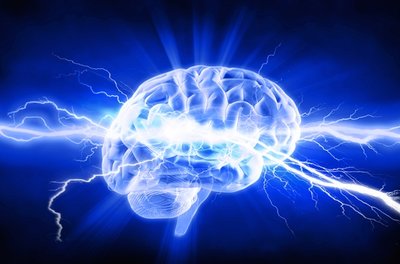
- Comparison: “It’s more difficult to withdraw people from BZs than it is from heroin.” (Lader M, 1999) 1
- Speed of development: “Tolerance and dependence can develop if BZs are used regularly for longer than 2-4 weeks. There is no minimum dose.” (Ashton H, 2009) 2 “Withdrawal symptoms (e.g. rebound insomnia) can appear following cessation of recommended doses after as little as one week of therapy.” (Biovail, 2007) 3
- Guidelines: “The Committee on Safety of Medicines and the Royal College of Psychiatrists in the UK concluded in various statements (1988 and 1992) that BZs are unsuitable for long-term use and that they should in general be prescribed for periods of 2-4 weeks only.” (Ashton H, 2002) 4
- Definition: “Generally ‘long-term’ means anything more than the recommended 2~4 weeks.” (Ashton H, 2012) 5
- Japan Guidelines: None (package inserts also insufficient).
Top of Page
- Chief complaint: Rotational vertigo attack.
- RXs: 3 BZs + 1 SSRI (total: 10 months – including reduction).
- Protocols: No informed consent or monitoring for dependency.
- Suitability: Experts verifications confirm the drugs were unsuited to both my actual condition (Vestibular Neuronitis) and the incorrectly diagnosed (Sylvian Aqueduct Syndrome).
- First few weeks: Initial settling of some symptoms.
- Following 2 months: Symptoms worsened (e.g. muscle stiffness) and new ones began appearing (e.g. palpitations).
- Following 4-6 months: Many new symptoms; e.g. tachycardia, pressure in chest, flushes, dry mouth, taste abnormalities, stomach pains, loss of libido, panic attacks, feeling detached, confusion, mood swings, aggression, feeling on verge of having fit / going mad, increased light sensitivity (with development of floaters), light flashes, exaggerated after-images, delayed focus, dystonia (jaw locking up), etc. (These intensified again during reduction and were accompanied by more new symptoms)
- Important: “When tolerance develops, ‘withdrawal’ symptoms can appear even though the user continues to take the drug. Thus the symptoms suffered by many long-term (1.4) users are a mixture of adverse effects of the drugs and ‘withdrawal’ effects due to tolerance.” (Ashton H, 2002) 4
Top of Page

- Comparison: “With heroin usually the withdrawal is over within a week or so. With BZs a proportion of patients go on to long-term withdrawal…I get letters from people saying that it can go on for 2 years or more. Some tranquilliser groups can document people who still have symptoms 10 years after stopping.” (Lader M, 1999) 1
- Clinical study: Recent research conducted by Swedish doctors showed many withdrawal symptoms were still present in subjects after 1 year when study concluded. Also noted were reports of some protracted withdrawal symptoms lasting longer than 5 years until amelioration. (Vikander B et al., 2010) 6
- Surveys: Existing reports on duration of withdrawal underestimate the problem because surveys are limited to short periods, progress of those who dropped out is not included, and cases of recurrence are not considered. (Ashton H, 1995) 7
- My case: Most of my withdrawal symptoms resolved within the first year of stopping; however, some symptoms (e.g. panic attacks) continued for many years, there were relapses, and it took about 10 years before I really felt my true self again.
Top of Page
Misprescribing is destroying lives

- Underestimating: “Benzodiazepine withdrawal is a severe illness. The patients were usually frightened, often in intense pain, and genuinely prostrated. The severity and duration of the illness are easily underestimated by medical and nursing staff, who tend to dismiss the symptoms as ‘neurotic’. In fact, through no fault of their own, the patients suffer considerable physical as well as mental distress.” (Ashton H, 1984) 8
- Rebound vs. withdrawal: Many doctors pass withdrawal reactions off as “rebound effects” assuming they are acceptable. “Some authors distinguish between rebound and withdrawal effects, but the mechanism is the same for both.” (Ashton H, Lader M, 1991) 9
- Inappropriate action: There are countless cases of misdiagnosing dependency during treatment, during reduction, and after abstinence; often followed by more inappropriate prescribing. Doctors are actually reprimanding patients seeking help. (Satoh M, 2012) 10
- My case: I tried escaping my drug treatment by getting a referral to another hospital. This resulted in my iatrogenic dependency being misdiagnosed, another inappropriate diagnosis given (Autonomic Nervous Disorder), and yet more BZs being prescribed.
Top of Page
- Expert warning (unheeded): In 1978, Prof. Lader called these drugs “the opium of the masses” because of the very high prescribing rates. In 1981 he warned that in the context of tranquilliser addiction “there is an epidemic in the making” and in 1988 he stated that this was the biggest medically-induced problem of the late 20th Century. (Lader M, 1978, 1981, 1988) 11
- Response: There has actually been a general global increase in the last decade. (INCB, 2010) 12
- Reason: See Who's Responsible? (Ashton H, 2006) 13
- Japan consumption per capita: The INCB 2010 Report shows Japan has the 2nd highest consumption rate of “anxiolytic” BZs in Asia and the 2nd highest rate of “sedative-hypnotic” BZs in the world. (INCB, 2010) 12
- Variable: Etizolam (Depas) was not included in this report, and if it were, Japan may show as the highest. (Toda, 2013) 14
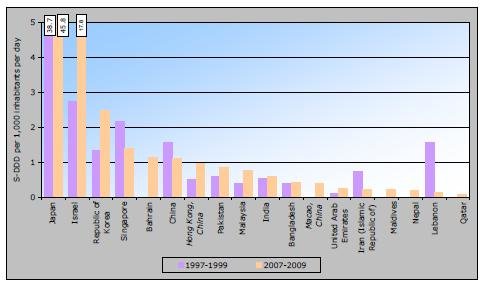
Figure 1: Average consumption of BZs (sedative-hypnotics) 1997-1999 and 2007-2009 (Source: INCB 2010 Report)
Top of Page
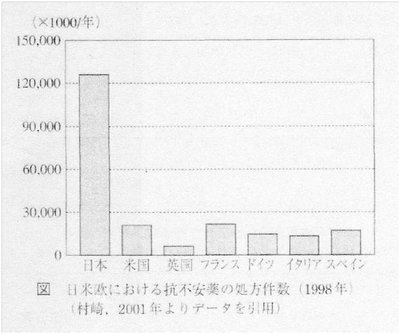
Figure 2: RX Anxiolytic numbers in Japan, Europe, US 1998 (Source: Murasaki 2001)
×1000 per year
- Japan consumption per RX number: The graph above is from a 2001 paper by Prof. Osamu Tajima who states “Looking at actual RX (anxiolytic BZ) numbers, Japan is 6-20 times higher than Europe and the United States.” (Tajima O, 2001) 15
- Meta-analysis: Risk of suicide seen in people suffering from substance disorders due to sedatives, hyponotics, anxiolytics, etc. including BZs is 20 times higher. (Harris EC, Barraclough B, 1997) 16. This meta-analysis is also quoted in a research report supported by Japan’s Ministry of Health. (Matsumoto T, 2010) 17
- Inconsistencies in statistics, media, laws:
(A) Statistics in media come from selective surveys.
(B) Many cases are not reported.
(C) Media do not make associations with RX drugs and accidents.
(D) RX drugs form a gateway to actual abuse.
(E) Japan has zero tolerance for drinking and driving, but are BZs and other psychotropic drugs acceptable?
- Socio-economic costs: See socio-economic costs. (Ashton H, 2002) 4
- Important: “The biggest drug-addiction problem in the world doesn't involve heroin, cocaine or marijuana. In fact, it doesn't involve an illegal drug at all. The world's biggest drug-addiction problem is posed by a group of drugs, the benzodiazepines, which are widely prescribed by doctors and taken by countless millions of perfectly ordinary people around the world”. (Coleman V, 1985) 18
Top of Page
Health Ministries and doctors inadertently creating addicts
In general, tolerance and dependency to BZs can develop if the drug is taken regularly for more than 2-4 weeks.
These processes can result in a combination of symptoms: (1) return of the original symptoms for which the drug was prescribed (due to tolerance) and at the same time (2) worsening of the original symptoms and/or addition of totally new symptoms that were not present before the drugs were prescribed (withdrawal symptoms due to dependence). These symptoms can occur together while still taking the prescribed drugs, during dosage reduction, or after withdrawal.
This phenomenon is not always understood by doctors, lawyers, or the courts and is the cause of many cases where dependency goes unrecognized.
Top of Page
Due to a lack of knowledge regarding points 1-5, together with a severe lack in appropriate controls, care and facilities, iatrogenic BZ dependency / addiction continues to be a most serious problem. The scale and seriousness are woefully underestimated by both medical and governmental regulating bodies.
This tragedy has continued for decades. Millions of people are being prescribed these largely unnecessary and dangerous drugs (BZs) long term, for often inappropriate reasons, by many kinds of doctors. Many people are unaware of what they are actually being prescribed, and end up suffering alone without knowing what is happening to them or why. They have nowhere to turn for help. This is having a massive effect on society.
BZ dependency is a truly global issue - the situation is URGENT and we all have a duty to do something about it NOW.
Top of Page
Experts have spoken - Action is needed now!
- Overreliance on drugs → Education in schools, lifestyle changes
- Over / misdiagnosing → Listen to patients more
- Over / misprescribing → Establish proper guidelines, explore non-drug options
- Lack of knowledge → Education for doctors / medical workers
- Lack of skilled staff → Provision of appropriate training (counselors, etc)
- Insufficient help → Establishment of specialist BZ withdrawal facilities
- Ambiguity of scale / severity → Thorough comprehensive research
- Stigma → Education, balanced media
- Distortion of public views / attitudes → Balanced media
- Loss of work / social abilities → Appropriate compensation, rehabilitation, retraining for victims / patients
Top of Page
I would like to acknowledge:
- The late Rt. Hon. James Dobbin for his tireless work regarding safer controls, patients’ rights and care.
- Prof. Heather Ashton and Prof. Malcolm Lader for their valued input.
- Dr. Graeme Judson for his ongoing support.
- My employer for his help and allowing time away from my part-time job.
- My grandmother on her 97th birthday – today October 6th, 2014.
- My mother for her loving support and perseverance throughout.
Top of Page
- Lader M. Benzodiazepines [Radio broadcast]. Face the Facts. London: BBC Radio 4; 1999 Mar 16.
- Ashton H. Literature Translations. E-mail to Wayne Douglas 2009 Mar 24.
- Lorazepam [package insert]. Bridgewater, NJ: Biovail Pharmaceuticals, Inc; Rev 2007.
- Ashton H. Benzodiazepines: How They Work and How to Withdraw. Rev 2002; 15.
- Ashton H. Confirmation (Long-term). E-mail to Wayne Douglas 2012 Aug 26.
- Vikander B, Koechling UM, Borg S, Tönne U, Hiltunen AJ. Benzodiazepine tapering: A prospective study. Nord J Psychiatry 2010; 64: 273–281.
- Ashton H. Protracted Withdrawal Symptoms from Benzodiazepines: The Post-withdrawal Syndrome. Psychiatric Annals 1995; 25: 174-179.
- Ashton H. Benzodiazepine Withdrawal: An Unfinished Story. BMJ 1984; 288: 1135.
- Ashton H. Protracted Withdrawal Syndromes from Benzodiazepines 1991; 8: 19-28.
- 佐藤光展 (読売新聞東京本社). 精神医療ダークサイド. 東京:講談社現代新書;2013. (Sato M, Yomiuri Newspaper reporter. The Dark Side of Mental Health. Tokyo: Kodansha 2013; 266.
- Lader M. Benzodiazepines: The Opium of the Masses. Neuroscience 1978; 3: 159-165. Lader M. Professor Malcolm H Lader: Quotations [Internet]. Available from: http://www.benzo.org.uk/lader2.htm
- United Nations. Report of the International Narcotics Control Board on the Availability of Internationally Controlled Drugs: Ensuring Adequate Access for Medical and Scientific Purposes (E/INCB/2010/1/Supp.1): 32, 35, 39.
- Ashton H. History of Medicines Involuntary Addiction [Presentation]. APRIL Charity Conference. Vancouver, BC: 2006 Apr 4.
- 戸田克広. ベンゾジアゼピンによる副作用と常用量依存. 臨床精神薬理 16: 867-878, 2013. (Toda K. Clinical Psychopharmacology: Benzodiazepine Side Effects & Therapeutic Dose Dependency 2013; 16: 867-878.)
- 田島治:ベンゾジアゼピン系薬物の処方を再考する.臨床精神医学 30: 1065-1069, 2001. (Tajima O. Clinical Psychiatry: Reconsidering prescriptions of benzodiazepines 2001; 30: 1065-1069.) 村崎光邦:わが国における向精神薬の現状と展望 -21世紀を目指して-. 臨床精神薬理 4: 3-27, 2001. (Murasaki M. Clinical Psychopharmacology: Present situation and new prospects of psychotropic drugs in Japan – Towards the 21th century – 2001; 4: 3-27.)
- Harris EC, Barraclough B. Suicide as an outcome for mental disorders: A meta-analysis. Br J Psychiatry 1997; 170: 205-28.
- 松本俊彦. 薬物依存者・アルコール依存者の自殺の実態解明と自殺予防に関する研究. 厚生労働科学研究費補助金分担研究報告書 2010; 41-55. (Matsumoto T. Suicide in Drug Dependents & Alcoholics: Suicide Prevention Research. Health and Labour Sciences Research Grant Joint Funded Report 2010; 41-55.)
- Coleman V. Life Without Tranquillisers. Essex: Piatkus Books; 1985.
Top of Page
SUPPLEMENTARY
NOTICE
I have included the following supplementary information on my litigation case in order to raise additional questions about who is protecting society.
WHO’S PROTECTING SOCIETY?

(My Case Example)
Basic History
Feb 2003: Preparations.
Feb 2006: Mediation (initially by myself) at Tokyo Summary Court.
Jun 2007: Tokyo District Court.
Sep 2008: Returned to Japan again to testify (no accommodation, job or money).
Sep 2009: Tokyo High Court.
May 2011: Appeal to Supreme Court (by myself in midst of 3/11 mega-quake and Fukushima nuclear disaster, jobless, homeless).
Oct 2011: Supreme Court decision.
Main Evidence
Patient files and DSM-IV-TR diagnostic criteria for drug (substance) dependency / addiction.
Main Arguments
Most inappropriately, the central argument became a case of whether I had Autonomic Nervous Disorder (AND) or iatrogenic BZ dependency.
Definition
AND is an umbrella term commonly used in Japan to describe: (A) Psychosomatic symptoms caused by a variety of stress / anxiety conditions, or (B) Any other condition where the autonomic nervous system acts in a way that produces symptoms, especially in cases where they are not sure of the cause.
NB
This argument was totally illogical because my entire nervous system had become hyperactive as a result of BZ dependency and withdrawal reactions (See Autonomic Nervous Disorder).
Top of Page
THE TOKYO HIGH COURT VERDICT

- Diagnostics excluded: 3 criterions were ignored in the verdict resulting in a failure to rule out the fact I was dependent in terms of the DSM-IV-TR which formed the overall basis for the entire case.
- Misquoting evidence: The High Court verdict stated “...the only written information contained in the package insert of the benzodiazepine type drugs is that it is possible for drug dependency to form on high repeated doses” However, also stated was “high or repeated doses.”
- Clinical information ignored: E.g. no prior neurological or psychological history, a series of failed attempts at stopping or reducing; ability to work before the drugs, work incapacitation following treatment, ability to return to work again after stopping etc.
- Selective symptom analysis: The judgment was based on a simple analysis of select symptoms that had been largely cut, misinterpreted or taken out of context.
- Withdrawal symptoms excluded: New symptoms recorded at the withdrawal facility during reduction were completely ignored. E.g. Myoclonic jerks, loss in coordination, paresthsia over face, tightness in cranial (feeling of tight band around head), oily smell emanating from body – glandular reactions etc.
- Facts misrepresented: The court concluded that because the dosage of BZs I was prescribed remained the same throughout the treatment, without any apparent efforts to seek dose increases, this showed that I had not developed tolerance and was therefore not addicted. However, this notion was a complete misrepresentation of our claim. That is: tolerance was manifested by a withdrawal reaction during the treatment; not a craving to increase dosages. This is the reason why the DSM-IV-TR Criterion 4 (Loss of Control) was applied but was ignored in the verdict.
- Unscientific term (diagnosis) employed: Despite the term Autonomic Nervous Disorder having no actual medical / scientific grounds for ruling out drug dependency, the courts accepted it as the determining factor in ruling out my case.
- Contextual facts ignored: E.g. the AND diagnosis only came after 6 months of BZs – never before.
- Relevance ill-considered: BZ dependency actually causes stress / anxiety and hyper-function of the autonomic nervous system and associated symptoms (so-called AND).
- Biased information employed: Drug company package inserts (full of inadequacies) used to determine dosage at which BZs could be deemed addictive.
- Credible evidence ignored: Expert opinions stating that dependency can, and does, develop on clinical doses if used for more than 2-4 weeks.
- Key witness denied testimony: Clinical Director and diagnosing doctor (twice without clear reason).
- Informed consent irrational: The judge never questioned the contradiction between the defendant doctor’s original diagnosis of “Sylvian Aqueduct Syndrome” and his prescribed drugs. Not to mention the fact the defendant doctor began claiming a totally new diagnosis (AND) for the first time only after court proceedings had begun.
- Monitoring irrational: The judge failed to distinguish between routine tests for checking balance functions and tests for checking the potential forming of drug dependency.
- Faulted proceedings: The original Chief Justice was replaced part way through proceedings by another Chief Justice who knew absolutely nothing about the case or BZ.
- Facts overlooked: One notable point in my case was that my health condition continued to improve even whilst being exposed to the most intense stress imaginable during court proceedings. This fact puts paid to the defense’s claim that my condition was simply caused by anxiety/stress alone and that I was prone to such. The reason being is that someone who is simply suffering from stress and prone to it wouldn’t be improving under increasingly stressful circumstances. It simply does not stand to reason. This was not considered in the verdict either.
- Final plea: In the very last sentence of my final statement, I posed the question “Why do you honestly think I ended up in a drug rehabilitation centre following 9 months of highly addictive BZ prescriptions?” The case closed without any response.
Details: (See Justice or Not?).
What do the world's 2 leading experts say?
Nearly all Wayne Douglas’s symptoms during BZ treatment, dosage reduction and withdrawal (recorded in Dr. Judson’s report) are due to dependence and symptoms of autonomic overactivity, which is common in these circumstances. Professor Heather Ashton. Emeritus Professor of Clinical Psychopharmacology, University of Newcastle upon Tyne, England.
Dear Wayne, You were certainly subject to judicial mishandling of your case! I greatly sympathise with you. Yours sincerely, Professor Malcolm Lader. O.B.E., LL.B., Ph.D., M.D., D.Sc., F.R.C. Psych., F. Med Sci. Emeritus Professor of Clinical Psychopharmacology.
Top of Page
The Japan dream: International relations career in Japan
The commitment: Japanese degree, JLPT 1, management diploma (communications, public relations), 16 years in Japan, worked for Japanese local government offices.
Midway: Suffered acute rotational vertigo attack.
System failure 1: The medical system (see points 1-5 above).
System failure 2: The legal system (see above)
System failure 3: The government (inadequate polices)
The result: At age 48, I have “nothing” – no home, no family, no savings, no assets, no security. I only have outstanding debts (education) and legal costs. Through no wrong doing on my part, I now live in state housing stuck in another country where I continue to suffer alone on a daily basis.
NB: I still have not been able to repay monies owing for the construction of benzocasejapan.com or participation in this conference.

Me outside my state housing unit
(Matsumoto, Nagano, Japan)
One Small example: My case is one small drop in the vast ocean of people suffering from BZ (and other RX drug) damages and system failures. Countless otherwise healthy, capable and well educated people are being thrown on the scrap heap. This is affecting all society.
Top of Page
After my court case and the 3/11 disaster (earthquake) in Fukushima, I established this website whilst residing in evacuee housing to help raise awareness. Content includes:
- The Ashton Manual (English and Japanese).
- List of check points for BZ dependency.
- Concern and information for 3-11 disaster victims including Fukushima, but applicable to all disaster / war zones, etc (See 3-11 and benzos).
- My story (The Japan Times).
Top of Page

This website has been constructed by me personally for the purpose of raising awareness about doctor induced benzodiazepine drug dependency and litigation problems.
The purpose of this site does not include any form of retribution. Also, for privacy reasons the defendants’ names along with certain other names have been omitted from all public documentation contained herein.
There are no other persons / parties involved and it in no way represents any organization or activist type movements.
It is not intended as medical or legal advice – please see Disclaimer.

Some parts of this website still have not been translated into Japanese. If anyone (native Japanese) would like to help on a volunteer basis, please contact mentioning the part you would like to translate. Thank you.
THE WRITING IS
ON THE WALL
for benzodiazepine use

Dr Andrew Byrne
Redfern NSW Australia
Benzodiazepine Dependence, 1997
“If any drug over time is going to just rob you of your identity [leading to] long, long term disaster, it has to be benzodiazepines.”

Dr John Marsden,
Institute of Psychiatry, London
November 1, 2007
“Benzos are responsible for more pain, unhappiness and damage than anything else in our society.”

Phil Woolas MP,
Deputy Leader of the House of Commons,
Oldham Chronicle, February 12, 2004
“The benzodiazepines are probably the most addictive drugs ever created and the vast army of enthusiastic doctors who prescribed these drugs by the tonne have created the world's largest drug addiction problem.”

The Drugs Myth, 1992
“If there's a pill, then pharmaceutical companies will find a disease for it.”

Jeremy Laurance,
The Independent, April 17, 2002.
“To rely on the drug companies for unbiased evaluations of their products makes about as much sense as relying on beer companies to teach us about alcoholism.”

Marcia Angell MD
(Former) Executive Editor New England Journal of Medicine
“It is more difficult to withdraw people from benzodiazepines than it is from heroin.”

Professor Malcolm H Lader
Institute of Psychiatry London
BBC Radio 4, Face The Facts
March 16, 1999
“Withdrawal symptoms can last months or years in 15% of long-term users. In some people, chronic use has resulted in long-term, possibly permanent disability.”

Professor C Heather Ashton
DM, FRCP,
Good Housekeeping, 2003
“Clearly, the aim of all involved in this sorry affair is the provision of justice for the victims of tranquillisers.”

As someone who has experienced both doctor induced benzo dependency and the effects of the 3-11 disaster, I immediately became concerned about the overprescribing of prescription drugs to the many thousands of people in the disaster areas.
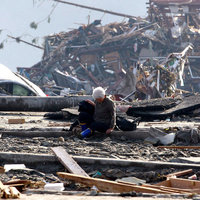
As it happened, I was writing my Supreme Court appeal in the midst of the disaster, so I took this opportunity to try and raise the alarm by including the following passage in my closing comments…
According to The International Narcotics Board 2010 Report, Japan has the highest average consumption rate of “anxiolytic” benzodiazepines in Asia with the only exception being Iran (See Figure 20 on page 35).

Although use for this indication is lower than in many European countries, Japan has the highest average consumption rate of “sedative-hypnotic” benzodiazepines in the world with the only exception being Belgium (See Figure 26 on page 39).
The Ashton Manual contains expert advice on benzodiazepines and how to withdrawal written by world renowned expert Prof. Heather Ashton.

The withdrawal schedules provided in the manual are only intended as "general guides". Each person's experience of withdrawal is unique and the course of withdrawal depends on many factors.
Don’t think benzos are dependence forming on prescription doses?
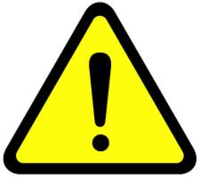
Think again!
“Tolerance and dependence can develop if benzodiazepines are used regularly for longer than 2-4 weeks. There is no minimum dose, for example tolerance and dependence have been observed after the regular use of 2.5-5mg of diazepam.”
Professor Heather Ashton: Emeritus Professor of Clinical Psychopharmacology, University of Newcastle upon Tyne, England
I went from being barely able to walk when I was on benzodiazepines to being able to squat 180kgs following abstinence and rehabilitation.

What are benzos for again?

The only time I’ve ever needed to visit a psychologist in my life was AFTER (wrongfully) being prescribed benzodiazepines…
Seems people are all saying the same things over and over…

- I was like a zombie
- It felt like I was in hell
- It was much harder to come off benzodiazepines than anything else I'd ever had before
- It took a chunk of my life away
- It has destroyed my life
- The doctor never told me they were addictive / The doctor told me they weren’t addictive
- When I complained my condition was worsening the doctor prescribed me more...
Cause for Alarm!

Consider this extract from:
A Review of David Healy's “The Psycho-pharmacologists III” by Professor Heather Ashton
How is it that the pharmaceutical industry has come to dominate the field?
Healy points out that drug companies “are now not simply confined to finding drugs for diseases. They have the power to all but find diseases to suit the drugs they have”.
Pierre Simon (Sanofi Pharmaceuticals) remarks: “In the beginning the pharmaceutical industry was run by chemists.
This was not so bad... Now most of them are run by people with MBAs... people who could be the chief executive of Renault, Volvo or anything.
They don't know anything about drugs.” The problem comes when a chemist presents an interesting drug to the financial analyst, who asks: “What is the market?”
The chemist has to decide for what indication the drug will be developed. If the indication is not there, it must be created.
It was difficult to get any relief from the ongoing symptoms
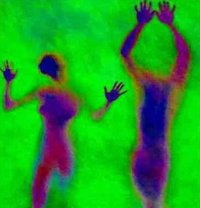
Unlike injuries where you may get some relief from adjusting your posture etc, with drug dependency in my case, the pain was both mental and physical and ran 24/7 regardless…
In my case, “confusion” appeared to be the main tactic of choice employed by the defense.

Enter the term “Autonomic Nervous Disorder” (The Perfect Smokescreen).
Most surprising of all, the high court relied on the packaging produced by the pharmaceutical company to determine the dosage at which benzodiazepines could be deemed addictive.

“I don't feel like I lost, I feel like I won and the court failed,” he says. “It feels like they were protecting the doctors and failed to protect society.” "What I want to do is use my experience and the material generated through my case to provide a resource to others who are dependent or may become dependent."
I included the quote in the top left corner of this site because many people thought I was crazy for pursuing my case.

However, my philosophy is we can either choose to do something, or choose to do nothing. The former gives way to hope for many people. The latter…? Whichever way, it’s all in our hands…
This page has been set up to give readers the opportunity to share their comments.

If you wish to send a message of your own please do so by sending an email through the contact page.
Alternatively, you can use the Benzo Case Japan facebook page.










